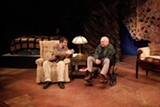[
{
"name": "500x250 Ad",
"insertPoint": "5",
"component": "15667920",
"parentWrapperClass": "",
"requiredCountToDisplay": "1"
}
]
Mitch Albom's "Tuesdays with Morrie" may have been a pop-culture juggernaut as a book; as a play it is pretty much Lifetime for guys. Albom's memoir of afternoons spent in the company of a college professor he remembered fondly, during the professor's last days, and the life lessons that resulted, was on the bestseller list for ages and was indeed made into a TV movie (though not a Lifetime movie). The book was anointed by Oprah Winfrey — and it was also made into a play, which Blackfriars is now presenting.
Given its great success, this is obviously a story that means a lot to a lot of people. But as a play, it seems awfully pale. Mitch (played by Stefan Cohen) begins the play with a fond reminiscence of Morrie Schwartz (Greg Byrne), his sociology professor when Mitch was a student, and an enthusiastic jazz pianist, at Brandeis University in the 1960's. When he graduates, Mitch promises to stay in touch with Morrie. But of course he doesn't — until one evening when he sees Morrie on "Nightline" talking about his affliction with Lou Gehrig's Disease. Student goes to see teacher for a final visit, which stretches into several months of Tuesday meetings until Morrie's death.
Morrie is facing death with equanimity; Mitch, a successful and overworked sports journalist, needs some instruction from his old teacher in, as the old song lyric puts it, the real stuff in life to cling to: wife, family, taking time for others. (Somewhat surprising advice, coming from a supposed firebrand who taught Angela Davis and Jerry Rubin; but I guess a radical can have a happy home life.) When Morrie dies, Mitch realizes he has learned how to lead a more meaningful life.
This is a very nice story, of course, and I don't doubt Albom's sincerity for a moment. (Apparently he doesn't either; his biography takes up an entire page of the program, so I guess Morrie didn't iron out his ego completely.) But as a play it is formulaic and thin. Albom has a best-seller writer's command of language — he gets the story told straightforwardly and pushes the right emotional buttons at the right times. But he has no distinctive style or command of language. (The most memorable line in "Tuesdays with Morrie" is a quotation from W. H. Auden.) And there are no real surprises along the way. You know how the play will end from the beginning, and can almost guess the content of each scene before it begins. Yes, it's a touching story, but we've seen it many times before, and often better done.
Part of the problem may be Albom's decision to write "Tuesdays with Morrie" as a two-character play, without the skill to create two fully rounded characters. Mitch and Morrie only play off each other; other people in their lives are referred to, or on the unheard end of a telephone conversation. They don't really exist in any kind of context, and a lot of the interesting stuff takes place offstage or is merely referred to. We are told too much. This play is partly about Mitch's transformation to a more caring person, but we have only his word for it. As Morrie no doubt wrote in more than one student term paper, "Show me, don't tell me!"
If "Tuesdays with Morrie" isn't much of a play, it is certainly well presented at Blackfriars. And well-furnished: John Haldoupis's set includes everything from a bed to large sofa to a baby grand piano. In creating a playing space for each scene of the play, he creates something of an obstacle course for the actors. As a director, Haldoupis does have them negotiating the course smoothly, but I wonder how a simpler, more abstract approach to staging this piece might work.
Greg Byrne and Stefan Cohen are local theater veterans, and have a fine chemistry together; I don't know if they ever performed together before this, but they obviously ought to do it again. Mutual respect and affection aren't inherently dramatic qualities, but these two men convey a lot of it very convincingly, giving the show a great deal of its substance. These are the kinds of performances that start well and get better and better throughout a play's run.
As noted above, as Mitch, Cohen has to do an awful lot of talking to the audience. But when he settles down for the scenes with his old teacher, his gradual transition from a hard-driven loudmouth into something of a mensch is nicely done. Playing a man dying of a terrible disease, Byrne has the showier role, and to his credit he doesn't show off in it all. The sheer sadness and pain in Byrne's face at certain moments in "Tuesdays with Morrie" is more eloquent than most of the words in the play.












